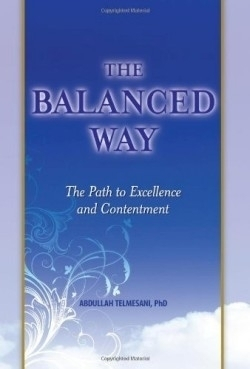The Balanced Way
“The ultimate question that stayed with me was how I could have contentment and a peaceful state of mind while not giving up my search for excellence and desires for a better future,” Abdullah Telmesani writes. In The Balanced Way, the author describes his own journey and takes readers along with him on a path toward balance and contentment.
Well-structured and clearly written, this self-help book explores ways in which readers can examine their own lives to effectively implement change and achieve goals. Pertinent inspirational quotes from various sources are generously sprinkled throughout the book, and the author includes several examples and case studies to illustrate concepts. Readers are offered concise and useful ideas for change and growth and are encouraged to explore how certain attitudes can enhance or detract from our daily lives.
Telmesani strives to provide readers with the tools needed to achieve balance in their own lives. Each section ends with a list of questions, called “Road Signs on the Path,” which ask readers to examine their own attitudes, ethics, or motivation for behavior. For instance, at the end of the section titled “Dealing Positively with Problems,” the author urges the reader to ask himself, “Do I sometimes talk about my problems and my bad luck in an attempt to win others’ sympathy or to justify my failures?” The suggested introspection can help readers to consider their standard approaches and identify areas for improvement.
Another tool Telmesani offers is a sixty-seven-page table at the end of the book designed to help readers better examine those questions listed on the Road Signs. With plenty of space to insert thoughts and ideas for achieving better balance, the tables act as a sort of workbook that could be helpful in identifying areas in need of attention. The first few pages of the table contain clear examples to guide the reader.
Readers looking for a “quick fix” won’t find it here; the author clearly illustrates his belief that ongoing individual introspection is the key to finding contentment and happiness. While he doesn’t claim to offer miracle cures for discontentment, Telmesani urges readers to constantly strive toward the ultimate goal of achieving balance, which he views as “Â…a basic requirement for the stability of our lives.”
Surprisingly comprehensive for such a short book, The Balanced Way could prove beneficial to anyone needing a nudge toward examining successes and failures in the ongoing effort to learn and grow. The author’s forthright approach and admission that he, too, is on a constant journey of self-discovery adds a conversational and comfortable tone to the book.
Disclosure: This article is not an endorsement, but a review. The publisher of this book provided free copies of the book and paid a small fee to have their book reviewed by a professional reviewer. Foreword Reviews and Clarion Reviews make no guarantee that the publisher will receive a positive review. Foreword Magazine, Inc. is disclosing this in accordance with the Federal Trade Commission’s 16 CFR, Part 255.

